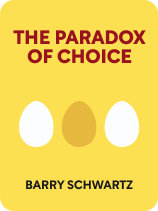

This article is an excerpt from the Shortform book guide to "The Paradox of Choice" by Barry Schwartz. Shortform has the world's best summaries and analyses of books you should be reading.
Like this article? Sign up for a free trial here .
What are the main factors that cause regret? Are there any benefits to feeling regret?
There are three main contributors to regret: omission bias, the nearness effect, and responsibility. Regret often makes us feel bad, but in some cases, it can actually be a good thing. There are also some steps you can take to benefit from your regret.
Continue below to learn about the psychology of regret.
Why We Regret
Everybody has felt regret in their life, but what is the psychology of regret? In his book The Paradox of Choice, Barry Schwartz describes three factors that influence how we experience regret:
1. Omission bias: When reflecting on the recent past, we regret choices we made instead of those we failed to make. The opposite is also true—when reflecting on the distant past, we tend to regret choices we failed to make instead of those we made.
(Shortform note: While Schwartz focuses on the individual effects of cognitive biases like omission bias, your decisions can have broader effects, as well. For instance, countries where you have to opt out of being an organ donor have high rates of organ donation: Since you have to actively decide against being an organ donor, opting out feels like doing harm, which you want to avoid. The United States, on the other hand, requires you to opt in to being an organ donor, and it has lower rates of organ donation—since you’re not acting by neglecting to opt in, you likely don’t feel as regretful about it.)
2. Nearness effect: If a choice nearly works out, we feel bad that it didn’t. For example, if you order a Christmas present that arrives on December 26, you might feel worse than if it had arrived after New Year’s. You’d feel that if you’d ordered it a day earlier, it might have arrived on time. However, if the present arrived even later you’d feel less in control of the outcome.
(Shortform note: In addition to creating regret, there’s evidence that the nearness effect also gives us a jolt of motivation. Research has suggested that when we almost win a game, part of us feels like we won, making us want to try again. The nearness effect, therefore, also poses a risk for people who engage in risky activities like gambling: If you rack up near-misses on the slot machines, for example, you’ll want to keep going, and likely end up regretful after the fact.)
3. Responsibility: We only regret choices we feel personally responsible for. If something goes wrong but we’re not at fault, we might feel bad, but we don’t personally regret it. But if something goes wrong because of a choice we made, we regret it because we feel that we’re responsible for the outcome.
(Shortform note: Some researchers have found that although we experience regret for decisions we’re responsible for, we experience greater disappointment for decisions we’re not responsible for. This is a different kind of negative feeling—instead of wishing we acted differently, we feel upset that we’ve been placed in an unsatisfying situation through no fault of our own. This is a benefit of regret: When we feel regret, we at least have the motivation and the ability to change our actions in the future.)
When these three factors combine, regret can grow even stronger.
The Benefits of Regret
While Schwartz has described the pitfalls of regret in relation to decision-making and expanded choice, he also emphasizes that regret has several useful purposes.
First, anticipatory regret forces us to take our decisions seriously, since we’re already concerned about the outcome before we’ve made the choice. Post-decision regret helps us to avoid making the same mistakes in the future.
Regret can also compel us to act in order to reduce the impact of our past mistakes, or to help to mend the damage they’ve caused. When you express regret, it tells others that you’re sorry for the harm you’ve caused, and that you aim to make better choices in the future.
These positive effects show that regret is a necessary, useful emotion. What Schwartz emphasizes is how regret can go too far, particularly when faced with expanded choice.
For those who have major issues with regret, such as maximizers, taking steps to reduce regret can positively impact their lives. Schwartz offers that some ways to reduce regret include practicing upward counterfactuals and aiming to satisfice in your decision-making.
| How to Benefit From Regret To make sure you benefit from your regret, try taking these steps. These will help you consider how you can use regret to make better choices in the future, instead of stewing over your regrets. 1. Acknowledge the regret you feel, but look for positive choices you can make in the future, instead of dwelling on the past. 2. If you struggle with regret spirals, find some ways to cut them off. It’s helpful to find tasks or projects to work on, since those will take your focus elsewhere. 3. Remind yourself that you can see the events you regret from a different point of view, and you can find positives in any decision. 4. Talk to yourself about your regrets like a trusted mentor or loved one would, instead of talking to yourself negatively. 5. Use your regret to determine what’s important in your life, and take this knowledge into your future decisions. 6. Take action to make better decisions in the future. Taking action is especially important because it helps you lessen future regret. For example, if you lost a job because you showed up late too often, you’d likely feel regret because of the consequences of your lateness. You could use this regret effectively: When you start a new job, you could make it a priority to always be on time. |

———End of Preview———
Like what you just read? Read the rest of the world's best book summary and analysis of Barry Schwartz's "The Paradox of Choice" at Shortform .
Here's what you'll find in our full The Paradox of Choice summary :
- Why the more choices we have, the more stressed and indecisive we feel
- How to better navigate our choices, from groceries to health insurance
- Whether it's better to seek the best or accept "good enough"






